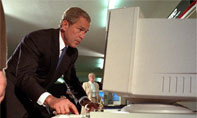- About Us
- Columns
- Letters
- Cartoons
- The Udder Limits
- Archives
- Ezy Reading Archive
- 2024 Cud Archives
- 2023 Cud Archives
- 2022 Cud Archives
- 2021 Cud Archives
- 2020 Cud Archives
- 2015-2019
- 2010-2014
- 2004-2009
 |
Ezy Reading: The Excrement Continues To Flow Forth - Politics Goes Online |
While the Internet has a history that can be traced well back into the 1950’s and 1960’s, in 1995 it was still very much in a stage of infancy in so far as the rest of the world catching up to the potential on offer was concerned.

Sure, a great many entrepreneurs, media outlets and governmental bodies like the World Bank and the United Nations were beginning to have an online presence, but the mass appeal and dot.com boom of the technology was still a year or two away. Indeed one of the first and, regrettably, most memorable websites I encountered in 1995 was something called ‘The Shit of the Day Home Page’. There was nothing complicated about the site- basically, people sent in photos of ‘masterful dumps’ they had taken earlier that day and shared them for other people’s viewing pleasure online. Charming, no? To a group of college students looking to spend as little time studying as possible, the now defunct Shit of the Day Home Page offered us a few gutter-humour giggles, but little else. While the Internet was an interesting outlet, so long as websites like this were doing the rounds, few of us considered the medium at the time as anything more than a novelty. Who, for instance, while grimacing at the sight of yet another turd rated ‘OUR READER’S #1 SHIT OF THE WEEK!’ could have ever envisioned the web becoming an important component of the political landscape?
I suppose, in retrospect, the kind of content on offer at Shit of the Day wasn’t too far removed from what was to become perhaps the most notable –and certainly the most notorious- first real step into political centre-stage for the Internet. This, of course, was the Monica Lewinsky ‘sex dress’ scandal that first surfaced on Matt Drudge’s ‘Drudge Report’ website in 1998, where he claimed that Lewinsky had spoken of owning “a garment with Clinton’s dried semen.” While this tabloid-fodder gossip that swiftly spread in a firestorm of activity to become international news offered plenty about the emergence of the Internet as a player in the mass media, it was also the first significant case where the Internet and World Wide Web had a direct role in affecting politics. Soon that semen-stained dress was to of course become a key piece of evidence for Independent Counsel Kenneth Starr in tying Lewinsky to President Clinton.
In the years since, as web user growth around the globe increased it wasn’t surprising that politics soon followed pace and appeared online in far more functional and practical forms that had less to do with Matt Drudge-style revelations that threatened to topple world leaders, and more to do with spreading the political message and maintaining good public relations, raising campaign funds and getting folks elected (or re-elected, as the case may be).
According to a Pew Internet Project data memo, in 2004 the key players in U.S Presidential politics spent $2.66 million in online banner ads, however while the amount paled in comparison to the proportion of campaign budgets spent elsewhere, such as television (in excess of $300 million), the amount nonetheless reflected an increased –if still untapped- respect for the medium as a method of reaching voters. i But back in 2004 arguably the most significant impact of the Internet upon politics was principally in fundraising and the influence of issue groups online.
Howard Dean’s early gains in his bid for Presidential candidacy in particular are now recognized as due in a large part to what were essentially pioneering efforts in the use of the Internet to rally supporters and raise money online, the latter of which generated contributions that well surpassed previous Democratic presidential primary fundraising records. ii In addition, Dean and other members of his staff maintained blogs during the campaign which was another innovative approach at that time. Similarly, the issue groups Moveon.org and NARAL Pro-Choice America helped pave the way for countless other organizations that play a key role today in raising money and communicating the political message to users online.
There are of course limits to the effectiveness of the Internet as a political tool. Statistically there are few individuals over the age of 65 who make much use of the medium, and though it is increasingly diminishing as an issue, computers have traditionally been more accessible to those of higher income levels. Others are still yet to be convinced as to the significant role the Internet truly can have upon affecting opinions as opposed to the more traditionally used outlets of the print, television and radio media. In this age of multitasking, many wonder whether the political message is not easily lost and forgotten amid so much spam mail sent daily to the rubbish bin.
In addition, especially with the emergence of influential political blogs online, including such sites as the Daily Kos, Instapundit and the Huffington Post, both major parties in America have expressed concern about the ‘complicating political influence’ blogs can have upon the predetermined ‘party line’. Moderate Democrats have especially been targets of left-wing blogs urging for further leftward shifts in political philosophy and practice. iii
Still, since 2004, campaigns at practically every level of politics have significantly turned their focus and attention toward the Internet and certainly few candidates today operate without an established ‘online campaign HQ’ presence. When some 70% of all Americans have access to the Internet it would be a foolhardy candidate that refused to recognize at the very least the important potential of the medium as a key component to political success, especially if we are to consider the affordable costs of campaigning and fundraising online, and the key youth voter/tech savvy demographic waiting to be tapped that may be better reached on the web by a political message than a more traditional (and expensive) television advertisement playing somewhere amid the glut of some 200+ satellite channels.
 But again, amid an increasing sea of opinions online, both from ‘authorized’ sources and less informed or ‘official’ voices, some problems have emerged. Inevitably decoy and smear websites have been established, and some linked right back to the major political parties. Most recently, the user-generated online encyclopaedia Wikipedia became a focus of media attention when it was discovered that political operatives had been covertly rewriting or defacing candidate’s biographical entries on the site for the benefit or detriment of those individuals. With the 2006 Congressional and 2008 White House elections looming, such activity, whether an ‘innocent prank’ or legitimate smear, can further muddle and have drastic consequences upon dissemination of the political message. iv
But again, amid an increasing sea of opinions online, both from ‘authorized’ sources and less informed or ‘official’ voices, some problems have emerged. Inevitably decoy and smear websites have been established, and some linked right back to the major political parties. Most recently, the user-generated online encyclopaedia Wikipedia became a focus of media attention when it was discovered that political operatives had been covertly rewriting or defacing candidate’s biographical entries on the site for the benefit or detriment of those individuals. With the 2006 Congressional and 2008 White House elections looming, such activity, whether an ‘innocent prank’ or legitimate smear, can further muddle and have drastic consequences upon dissemination of the political message. iv
Given the powerful potential on offer online, the Internet is increasingly now coming under scrutiny, especially with regard to the aforementioned spread of negative information, but also in affecting the rewriting of rules of advertising, fund-raising and mobilising support. The Federal Election Commission (FEC) has taken a closer look at, for instance, what might be deemed a ‘campaign contribution’ and matters of definition may need to be changed. Where an individual had already donated the legal maximum to a campaign but was an influential blogger with a substantial readership, a web link or banner ad to a candidate’s site could be considered a form of ‘contribution’, even as bloggers are subject to a press exemption when endorsing candidates or expressing political opinions. In March, however, the FEC announced that campaign finance laws would not apply to most political activity on the internet, and that only paid political advertisements placed on another person’s website would be regulated. v This effectively has struck fear into political parties that may now be subject to the unfettered ongoing support –but also unfettered ongoing attacks- from bloggers or individuals online free to express their political opinions without spending or other regulation limits applicable to their activities.
With the emergence of these kinds of complex legal, ethical and other issues it is clear that the Internet has now well and truly surpassed the novelty –and excremental- offerings presented in the early days. So long as information is communicated freely online there will always be the potential for scandal, criticism, support, fundraising, and the spread of the political message to play an important and an ongoing, critical role in determining political outcomes. As in any medium, however, we can only hope that the audience will be wise and discerning enough to filter out the facts and truths from the slush, propaganda and disinformation and what may merely turn out to be just another ‘shit of the day’.
iAdvertising Budgets in 2004 Campaign’, campaignaudit.org, December 8, 2004.
iiPolitics Faces Sweeping Changes on The Web’, Adam Nagourney, The New York Times, April 2, 2006.
iiiIbid.
‘ivPolitical Pranksters Using Dirty Tricks to Smear Opponents’, Shannon McCaffrey, The Associated Press, April 28, 2006.
‘vFEC Rules Exempt Blogs From Internet Political Limits’, Thomas B. Edsall, The Washington Post, March 28, 2006.
